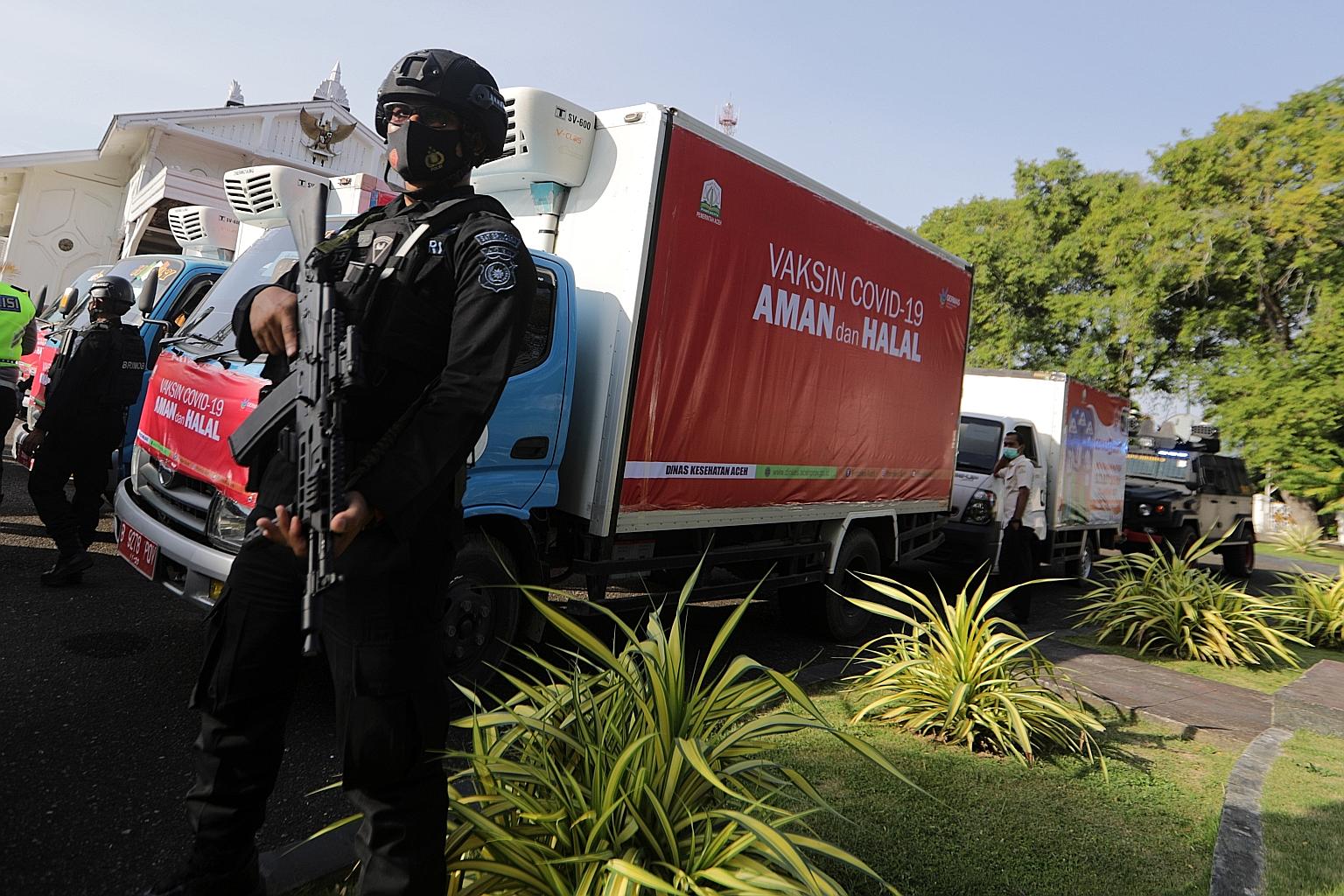Coronavirus Asia
Indonesia's vaccine roll-out hindered by limited logistics
Country needs more refrigerated trucks, cold storage, containers
Sign up now: Get insights on Asia's fast-moving developments

A security officer guarding containers carrying Covid-19 vaccines to be distributed to urban areas in Aceh, Indonesia, last week. Last month, state-owned pharmaceutical company Bio Farma began distributing three million doses of its Coronavac vaccine from China's Sinovac to all 34 provinces.
PHOTO: EPA-EFE
In Indonesia, it can cost twice as much to transport a refrigerated container of oranges from Jakarta to Jayapura, in Papua, a distance of more than 4,300km, than it does to import it from Shanghai, a similar distance away.
Shipping can be tricky in the world's largest archipelago.
The country is thought to have a fraction of the refrigerated trucks, cold storage and containers that its size and population should warrant, according to industry watchers. Bottlenecks at ports and traffic add up to the region's highest shipping costs.
So logistics managers scrambled for spare capacity when the government of President Joko Widodo approached industry representatives to help move hundreds of millions of doses of vaccine across three time zones in the country.
For now, there is space, thanks in part to idle trucks and containers as some clients shelve orders for perishable goods and because of the slack that big logistics firms keep handy for sudden requests.
But, without added investment in cold storage and trucks as the vaccine roll-out ramps up, shippers say they may need to bump less crucial items.
"We may have to choose items of lower priority," said Mr Hamzah Priyantoro, chief operating officer of Kiat Ananda, Indonesia's biggest logistics company.
Wanting to be seen to be doing its part, the company is committed to devoting resources to vaccine distribution, he added.
"Of course, if the government comes to us and says, 'Please support us with the vaccine', then we have to."
Last month, state-owned pharmaceutical company Bio Farma began distributing three million doses of its Coronavac vaccine from China's Sinovac to all 34 provinces. The military and police were mobilised to distribute the vaccines meant for healthcare workers.
Indonesia plans to vaccinate 181.5 million people, or two-thirds of its 270 million population, in 15 months to achieve herd immunity.
But as the immunisation drive cranks up to nearly a million doses every day, Mr Joko's government and the nation's state-owned enterprises are expected to enlist the help of domestic shippers.
Mr Nandi Suwandi, general manager of marketing at MGM Bosco, which operates the country's biggest fleet of refrigerated trucks, has already rented out trucks to state-owned Indofarma to ferry vaccines around 12 cities including Jakarta, Surabaya and Medan. Four more cities will be added next month.
But there are big challenges ahead. Maintenance facilities outside of the big urban areas of Java are scarce. Power grids in more remote areas cannot accommodate many extra refrigerating units. A single 20-foot container consumes 12,000 watts at start-up, like flicking on half a dozen fair-sized air-conditioners at once.
"Business in cold chain is concentrated in Java. We have challenges to the east of Indonesia," said Mr Nandi. "But we are ready to help the government."
To be sure, cold-chain logistics is a fast-growing business. Industry data says the country's 30 or so logistics companies ship just shy of 10 million tonnes of cargo a year.
But the fast-growing number of consumers who can afford processed food and restaurant meals could support more than 33 million tonnes a year, says the Indonesian Cold Chain Association.
MGM Bosco has quadrupled the number of refrigerated trucks in its fleet to 830.
At least a quarter of those trucks are available to ship vaccines, Mr Nandi said.
Anticipating the end of the pandemic, Kiat Ananda, which incidentally is also the country's biggest cold-chain logistics company - including containers and storage - has plans to boost capacity by a third by the end of next year with new warehouses opening in Jakarta and Surabaya.
Like many other businesses in Indonesia, cold-chain logistics companies have also been hit by the Covid-19 pandemic as clients get slower at paying their bills.
Mr Hamzah said accounts receivable have blown out from 50 days to about 70 days.
"We have to go hand in hand with our clients," he said. "We are in survival mode."


